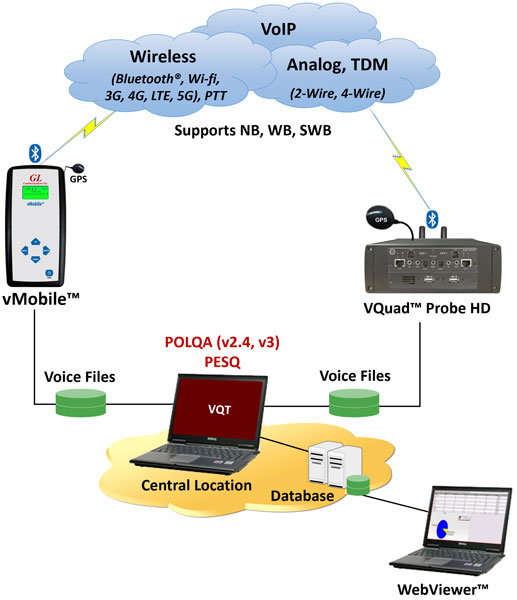GL Announces Voice Quality Testing Solutions
Gaithersburg, Maryland, USA - Apr 05, 2022 - GL Communications Inc., a global leader in telecom test and measurement solutions, addressed the press regarding their Voice Quality Testing (VQT) Solutions for fixed, mobile, and IP-based networks using Perceptual Objective Listening Quality Analysis (POLQA) and Perceptual Evaluation of Speech Quality (PESQ) standards.

Voice Quality Testing Solutions
“GL’s VQT software utilizes widely accepted algorithms to provide measurements of voice quality over all types of networks including ATM, VoIP, PSTN, and Cellular. It supports next-generation VQT algorithms for IP networks using POLQA per ITU-T P.863, and PESQ per Rec. P.862.1 and P.862.2,” said Robert Bichefsky, Director of Engineering at GL Communications Inc.
He further added, “The PESQ algorithm provides an objective measurement of subjective listening tests on telephony systems. The POLQA algorithm is a next-generation voice quality testing standard for fixed, mobile, and IP-based networks and supports the latest HD-quality speech coding and network transport technology, with higher accuracy for 3G, 4G/LTE, 5G, and VoIP networks including Over-The-Top (OTT) apps and Voice over Wi-Fi (VoWiFi). The algorithm also provides Signal and Noise Levels along with Jitter measurements”.
Moving forward with the optional POLQA v3 release supports Full Band Audio Analysis which provides improved scoring for mobile-based Voice over Long-Term Evolution (VoLTE), 5G, and OTT applications using EVS and OPUS codecs. It also supports a less harsh analysis of micro pauses within the speech, reacts with less sensitivity to linear frequency distortions, and includes a significantly improved and streamlined perceptual model.
The GL VQT software is a standalone product that can be configured for fully automated operation. Once the VQT application detects a PCM/WAV voice (degraded voice) file in a user-specified directory, the VQT software will automatically apply the algorithm against the reference and degraded PCM/WAV voice files and compute a Mean Opinion Score (MOS).
GL VQT software supports remote operation using the Command Line Interface (CLI) and Application Programming Interface (API) functions supporting WinOS, Linux, and macOS. The results of the VQT algorithm are reported directly in the stand-alone VQT application while also being saved to VQT log files. These results can also be sent to a Central Database where GL’s web-based dashboard, known as WebViewer™, is deployed. This gives the user a convenient web interface for easy monitoring and remote control of the entire voice quality test.
Key Features
- Test voice quality over all types of telecom networks—Wireless, VoIP, TDM, and PSTN
- Updates associated with POLQA v3 include a redesigned perceptual model for Full Band Audio analysis which is validated for VoLTE, 5G, and OTT apps (supporting EVS and OPUS codecs)
- Evaluate audio quality using the VQT MOS and E-Model along with additional metrics including SNR, Jitter, Clipping, Signal Level, Noise Level, and Delay measurements
- Manual or Automated modes of operation with centralized data access. Automatic Mode allows the VQT software to automatically analyze files from a user-specified directory
- Remote control of the VQT application using the supplied CLI and API functions supporting WinOS, Linux, and macOS
- Analyze 12-bit degraded files with 16-bit Reference files
- Analyze the effects of Codec Compression in Wireless Networks
- Supports POLQA ITU-T P.863 for next-generation voice quality testing supporting Narrowband (NB) (8000 sampling), Wideband (WB) (16000 sampling), and Super Wideband (SWB) (48000 sampling)
- VQT POLQA and PESQ supports analysis of 8-bit compressed a-Law and mu-Law files
 Back to Press Releases Index Page
Back to Press Releases Index Page